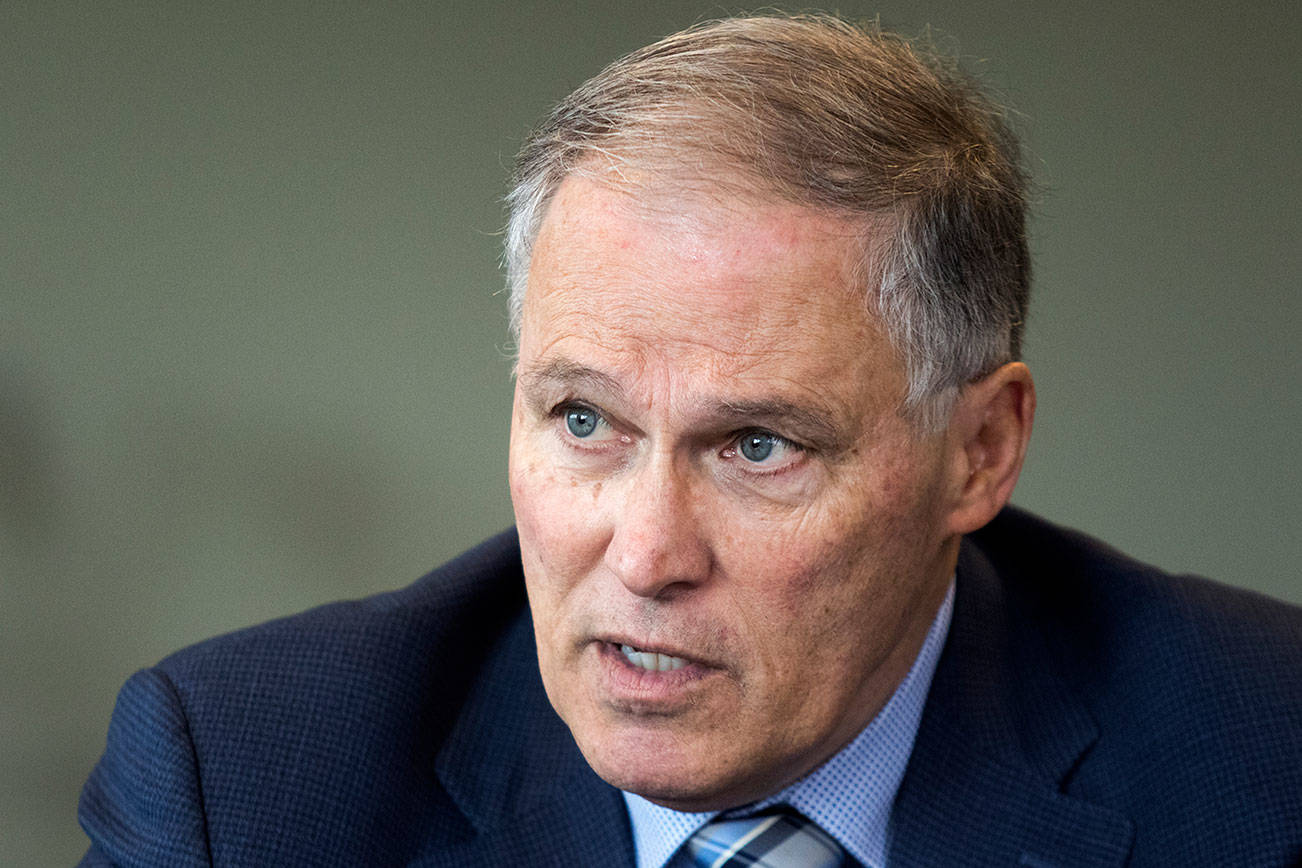Gov. Jay Inslee on May 4 signed bills that will impose a new tax on the state’s super wealthy and offer a bit of cash back to the poorest of Washington’s taxpayers.
Seated at a table outside the Tukwila Community Center, Inslee first put his signature on the Working Families Tax Exemption which will steer annual rebates of up to $1,200 to low-income individuals and families across the state.
Then, he inked the capital gains tax, a highly controversial measure that is already the target of one lawsuit challenging its legality.
Combined, the two laws represent a major stride of the Democrats’ left flank — backed by a coalition of social advocates and political progressives — to recalibrate a tax system considered among the nation’s most regressive because it takes a larger bite of income from those who earn the least and a smaller bite from those who make the most.
“Today marks the beginning of the end of that inequity,” said Rep. Noel Frame, D-Seattle, chair of the House Finance Committee, at the televised signing ceremony. “With the signing of this new capital gains excise tax into law we are finally, finally asking the wealthiest among us to pay their fair share.”
Inslee, a Democrat in his third term, described the bills as “the biggest steps forward in my life” to tackle economic inequality in the state.
Both bills have been in the works a while. They encountered far different receptions in the Legislature.
State lawmakers created the Working Families Tax Exemption program in 2008 but never funded it, until this session.
House Bill 1297 sponsored by Rep. My-Linh Thai, D-Bellevue, passed with nearly unanimous support of both parties in the House and Senate — though Republicans’ ardent backing received no mention from Inslee and other participants Tuesday.
Meanwhile, efforts to enact a capital gains tax predate Inslee’s arrival as governor in 2013.
Majority Democrats pushed Senate Bill 5096 across the finish line this session by overriding opposition of their moderate members and all Republicans. It passed the Democratic-led Senate on a 25-24 vote on the final day of session after clearing the House on a 52-44 vote the night before.
“It’s been a long time coming,” said Sen. June Robinson, D-Everett, the bill’s prime sponsor who did not attend Tuesday’s signing. “It is an important step I believe toward reforming our tax system.”
The law will levy an excise tax of 7% on certain capital gains starting Jan. 1. The tax targets gains derived from the sale of long-term assets like stocks and bonds. It would apply to amounts above $250,000. In other words, a person would need to realize at least $250,001 of capital gains before the tax would kick in.
Retirement accounts, real estate, farms and forestry are exempt from the tax. Business owners are exempt from the tax if they were regularly involved in running the business for five of the previous 10 years before they sell, own it for at least five years, and gross $10 million or less a year before the sale.
And, in the final days of negotiations, it was agreed to allow a taxpayer to deduct up to $100,000 a year from their capital gains if they made more than $250,000 in charitable donations in the same tax year. Those donations must go to nonprofits “principally directed or managed” in the state, per the law.
This tax is projected to bring in $415 million in 2023, the first year the state would see money from the tax. Those dollars would get deposited in the Education Legacy Trust Account to be spent on early learning programs, child care assistance and other education programs. If annual proceeds ever exceed $500 million, some would go into school construction.
However, the lawsuit filed April 28 by the Freedom Foundation — and a second one expected soon — could put a damper on the timing.
The suit, filed in Douglas County, asserts the tax is an income tax which is not allowed under the state constitution. They also said it violates the Commerce Clause of the U.S. Constitution.
“Today, Gov. Inslee made it official. Washington state is coming after your income, one way or another,” said Aaron Withe, CEO of the Freedom Foundation, in a prepared statement.”Elected officials are counting on voters assuming the new capital gains income tax will only affect the wealthy. But the negative consequences for job creation, entrepreneurship and the economy will be felt across Washington state.”
Inslee told reporters he’s not worried.
“This is an excise tax,” he said. “I’m confident it will be upheld because it’s based on justice and fairness because it’s going to right a wrong and that wrong is that working people are paying too much in their taxes. It’s not fair.”
Meanwhile, the working families tax exemption will provide amounts ranging from $300 for eligible individuals with no children to $1,200 for eligible persons with three or more qualifying children. In some cases, individuals who received federal benefits could get a smaller rebate. The minimum amount for an eligible person is $50.
An estimated 420,000 taxpayers could be in line for rebates starting in 2023 at a cost of around $261 million to the state.


